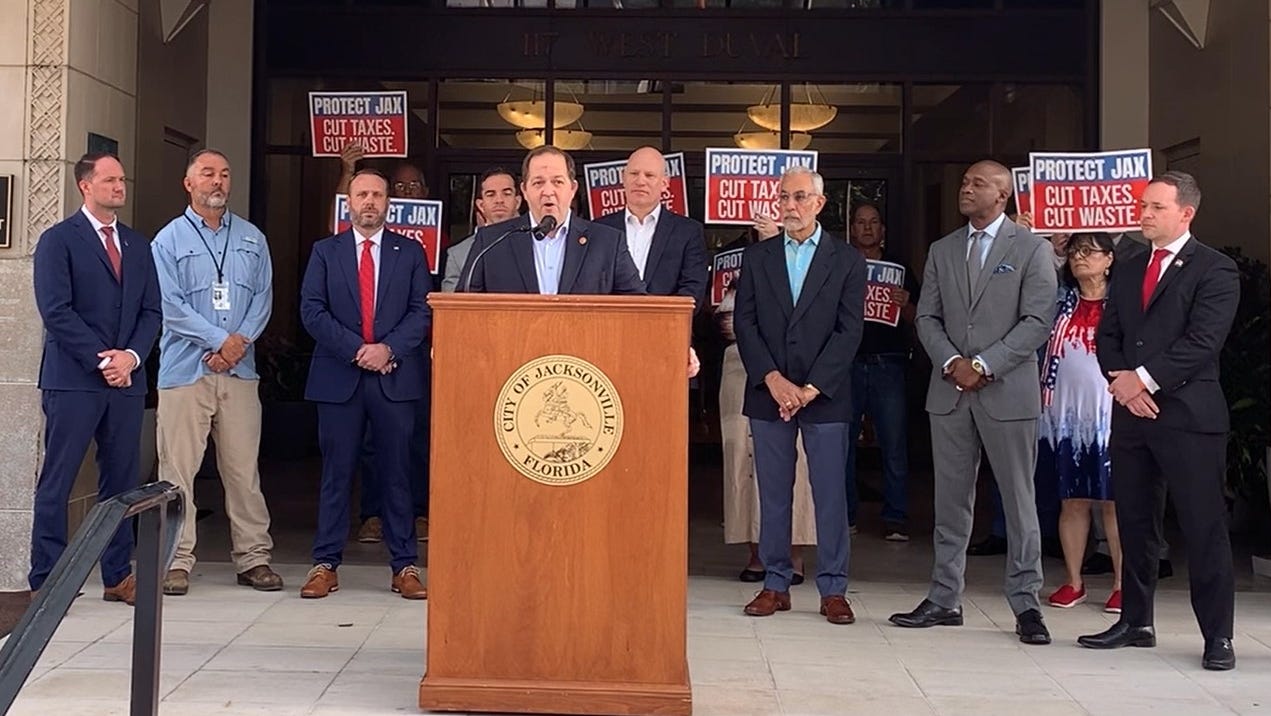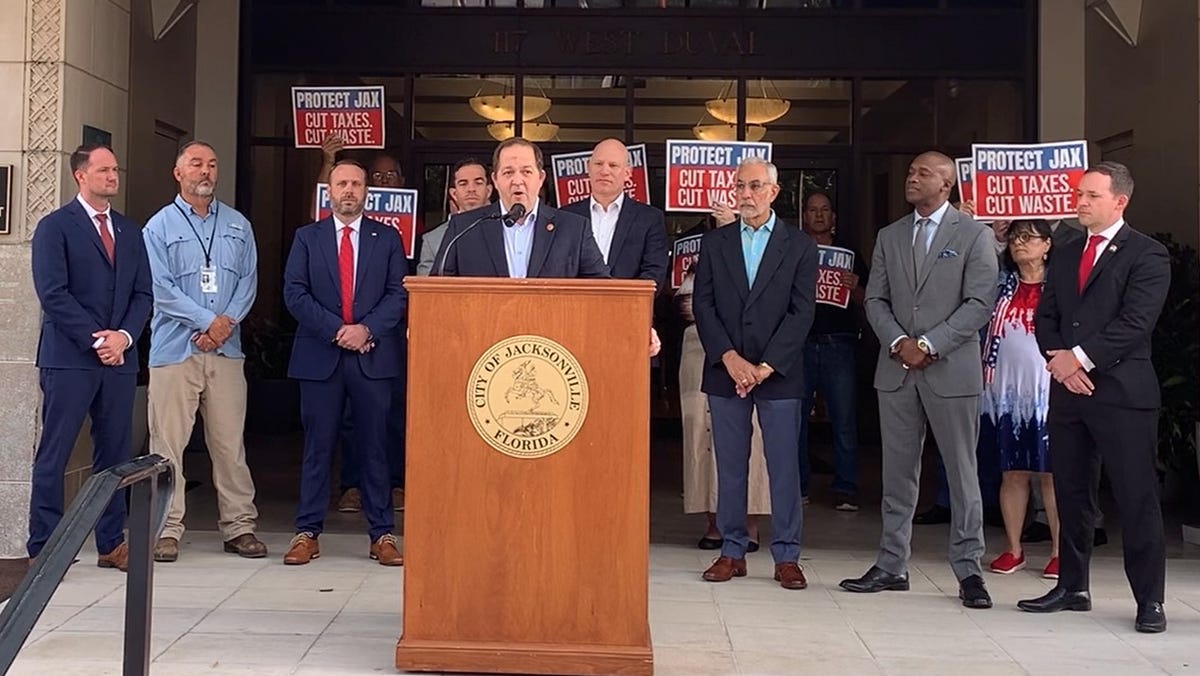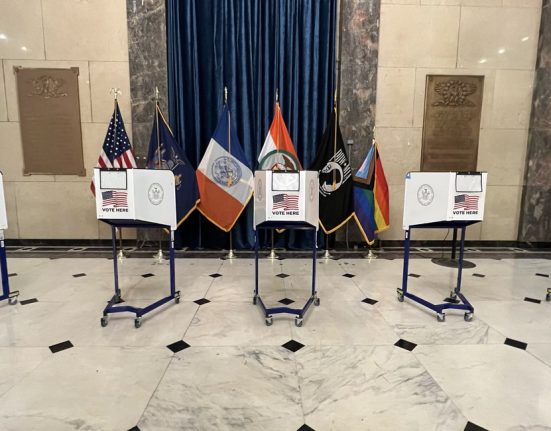
Florida GOP Chair Evan Power calls for Jacksonville property tax cut
Florida Republican Party Chairman Evan Power says if Jacksonville can cut its property tax rate, so can other Florida cities
- Jacksonville City Council President Kevin Carrico is urging residents to support a property tax rate cut.
- Mayor Donna Deegan opposes the cut, calling it a political move influenced by state officials.
- The proposed cut would reduce the tax rate by about 1%, saving the average homeowner around $19 annually.
- The full City Council will vote on the final budget and tax rate in September.
A majority of Jacksonville City Council has lined up in support of trimming the city’s property tax rate for the first time since 2022 in a shift that’s gained attention from state leaders and the head of the Republican Party of Florida.
State GOP Chairman Evan Power joined City Council President Kevin Carrico and other council members Aug. 25 on the steps of City Hall where local Republicans held posters that said “Protect Jax. Cut taxes. Cut waste.”
“We need to continue to push and say, ‘Enough is enough,'” Carrico said. “We want the relief. We want to give the money back to the citizens.”
Jacksonville is among the cities that Gov. Ron DeSantis and state Chief Financial Officer Blaise Ingoglia have criticized for their spending levels that have risen in tandem with recent growth in the property tax base.
Ingoglia previously praised the City Council’s Finance Committee for supporting a millage cut for property taxes. Power struck a similar note.
“Property tax is the No. 1 issue facing Floridians, and if Jacksonville can make the tough decisions, so can every other city government across the state,” he said.
Mayor Deegan: tax rate cut is ‘simply a political move’
Hours after Carrico’s event, Mayor Donna Deegan told reporters her budget is about solving problems that residents care about while council members pressing for the millage cut are bowing to political pressure from state officials.
“This is, frankly, simply a political move,” Deegan said.
The Finance Committee’s proposed millage rate for property taxes is about 1% lower than the current rate. The owner of a $200,000 home with a $50,000 homestead exemption would pay about $19 less in city taxes than if the city keeps using the same rate.
Deegan said that equates to about $1 a day in savings for the average homeowner. She said roughly half the city’s residents are renters who wouldn’t get anything from the millage rate reduction. On the spending side, she said the Finance Committee removed millions of dollars her budget put forward for affordable housing, reducing homelessness and healthcare programs..
She said Jacksonville has had a history of making progress on building a high quality of life for residents and then letting those gains slip away.
“We make some momentum and some progress and then it gets pulled back because there’s always a group of people that once that progress starts, they want to pull us back,” she said. “And that’s what’s happening now.”
Council could take early vote on tax rate at Sept. 9 meeting
The full City Council will vote Sept. 23 on the final version of the budget in what could be a vote-a-rama on individual spending items.
But on the question of the millage rate for property taxes, Carrico said he will ask council to vote Sept. 9 to establish the lower tax rate. Once a lower rate is approved by council, it cannot be raised at the Sept. 23 meeting.
Finance Committee members Raul Arias, Nick Howland, Ron Salem, Rory Diamond, Joe Carlucci and Will Lahnen voted Aug. 7 for a rate cut during their budget hearings, as did Carrico when he joined the committee to cast a vote on it. The lower rate trims about $13 million from the revenue Deegan used to help balance her $2 billion budget.
Three other council members — Terrance Freeman, Mike Gay and Chris Miller — stood with Carrico at the event on the City Hall steps. That would add up to 10 votes for the property tax cut, which is a majority of the 19-member City Council.
So far, all the council members who have signaled support are Republicans. But Carrico said it’s a bipartisan issue based on calls from property-owners getting notices in the mail of what their tax bills could be later this year.
“This isn’t a Republican issue,” he said. “This isn’t a Democrat issue. This is an issue for the people.”
Arias, who is chairman of the Finance Committee, said the tax rate cut is modest but it “represents something bigger” than the numerical amount.
“It represents our commitment to review the millage regularly and ensure that government doesn’t grow more than it needs,” he said.
Deegan’s proposed budget for 2025-26 would keep the city’s property tax rate at about $11.32 per $1,000 of taxable property value. The Finance Committee voted Aug. 7 to lower that rate to about $11.19 per $1,000 of taxable property value.
The state Save Our Homes amendment caps the growth in assessed value on homestead properties to 3% or the inflation rate, whichever is less. This year, the Save Our Homes cap is 2.9%.
Because of the increase in assessed value, most homeowners will still see a bigger tax bill from the city even with a 1% cut in the property tax rate. But the increase won’t be as much as it would be if the millage rate stays the same.
Carrico said any money that stays in the hands of taxpayers counts as relief.
“The budget’s not over yet, but I think it’s a good start and I think in future years we’ll continue to look at more wasteful spending and more future cuts if we can make them,” Carrico said.
As City Council heads to its budget votes in September, Deegan plans to have six town hall meetings across the city from Sept. 2 to Sept. 18 to rally support for her budget.
She noted the Finance Committee partially restored funding it cut from her proposed budget for Meals on Wheels, the JaxCareConnect network of community health clinics and Healthlink Jax telehealth program after hearing from the public.
The Finance Committee moved closer to Deegan’s budget on JaxCareConnect and Healthlink Jax after City Council member Michael Boylan convened a meeting that drew dozens of people in support of those programs.
Boylan said programs that give alternatives to emergency room visits takes a page from council’s own Critical Quality of Life Issues study in 2023 that examined access to health care, affordable housing and homelessness.
He said shifting people away from emergency rooms for non-emergency care ultimately makes the health care system less costly for everyone.
“It’s more head than heart in many respects,” Boylan said. “It’s common sense. The small investment we make as a city, it benefits our taxpayers as well as saves lives.”







